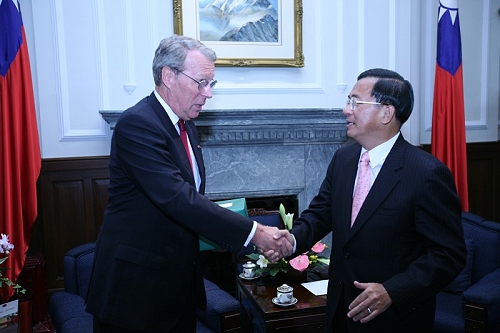News & activities
 News releases
News releases
President Chen Shui-bian on the morning of March 28 met with American Institute in Taiwan Chairman Raymond F. Burghardt at the Presidential Office. The president extended a warm welcome and expressed his appreciation to Chairman Burghardt. The two exchanged opinions on a broad range of issues of mutual concern.
President Chen said that he is delighted to have the opportunity to meet again with Chairman Burghardt after the recently held presidential election here. The president said that while the result of the election was not in favor of the ruling party, the election demonstrated the democratic maturity of the people of Taiwan as well as the self-restraint of the populace. He said that Taiwan's democratic accomplishments were on display for the whole world to see.
The president furthermore said that over the past eight years, he has repeatedly stressed that he would not allow the outbreak of war between the two sides of the Taiwan Strait nor would he let Taiwan be pushed to the brink of conflict. He said that over this period, peace and stability have been maintained between the two sides of the Taiwan Strait, which is an accomplishment he is proud of. The president also said that eight years ago he repeatedly pledged to the United States government that he would adhere to his "Four No's" policy. Over this eight-year period, he has never amended this promise. The president said that he will continue to abide by his pledge all the way until the handover of power on May 20.
President Chen said that media reports have said that on March 26 United States President George W. Bush and China President Hu Jintao spoke over the phone. Reports said that the two of them during their discussions mentioned the "1992 consensus" and that this serves as the foundation of dialogue between Taiwan and China. The two leaders also mentioned the issue that "the definition of one China is subject to respective interpretations by the two sides." President Chen stressed that his administration has always had the objective of engaging in dialogue and negotiation with China. However, historical truths cannot be fabricated and the meanings of things should not be misunderstood. He said that the so-called "1992 consensus" that is based on "respective interpretations by the two sides" is a phrase that was made up by the then Mainland Affairs Council Chairman Su Chi in 2000.
President Chen said that over the past eight years, Beijing has on occasion sought for him to accept the "1992 consensus." However, he said that the basis of the "1992 consensus" does not exist. As a result, the President said that it would be quite strange to hold cross-strait dialogue based on the "1992 consensus" and furthermore interpret the "1992 consensus" as "the definition of one China is subject to respective interpretations by the two sides."
President Chen added that the understanding of the "1992 consensus" among the authorities in Beijing is that it is a consensus of "one China" and that there was no consensus of "respective interpretations by the two sides." Beijing feels that the talks between the two sides held in 1992 were held on the basis that both sides accepted the "Two Sides, One China" principle. However, "the definition of one China is subject to respective interpretations by the two sides" was only something that was discussed. No conclusion was reached and as a result there was no consensus, he said.
President Chen furthermore said that Beijing specially makes note that the so-called "the definition of one China is subject to respective interpretations by the two sides" or "each side having its own interpretation of one China" is equivalent to accepting "two Chinas." Beijing, however, not only opposes a "one China, one Taiwan" stance, but also is against a "two Chinas" policy. He said he has never heard China regard Taiwan or the Republic of China as a sovereign nation, nor has he ever heard of China agreeing to the Republic of China as the basis of "one China."
Chairman Burghardt said that even though the outcome of the presidential election was not as the ruling party had hoped, President Chen has served as a model as the first leader of Taiwan to be from an opposition party. Over the coming weeks, he will transfer power to the next president in a peaceful and stable manner. Chairman Burghardt said that President Chen's leadership and the democratic accomplishments of Taiwan have proven to both Taiwan's neighbors and the world that it has instituted a true democracy. This is another accomplishment of the president in his eight years of watching over Taiwan.
Chairman Burghardt expressed his hopes that the people of the two sides of the Taiwan Strait will be able to find a means to hold a dialogue in the future. He also expressed that he will respect the choices made by the people on either side of the Taiwan Strait.



